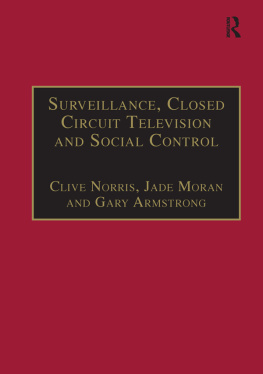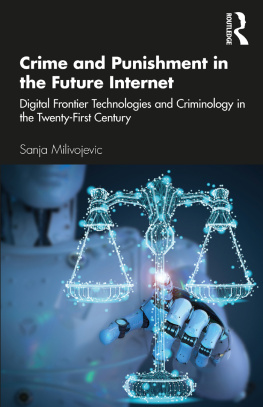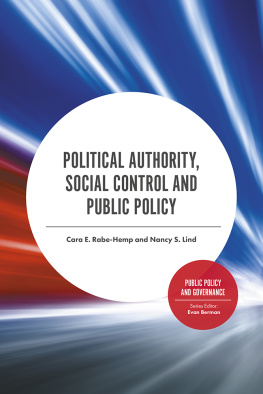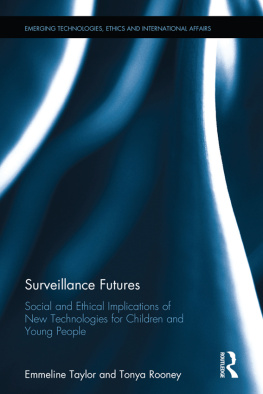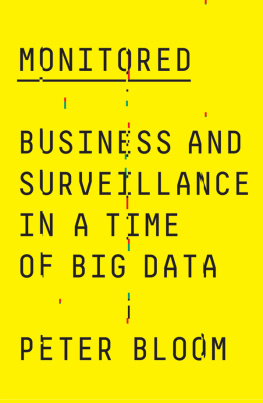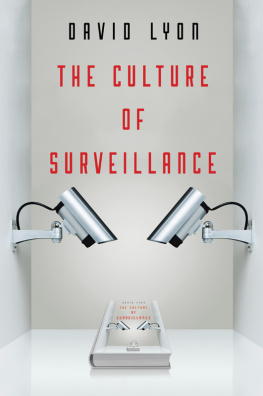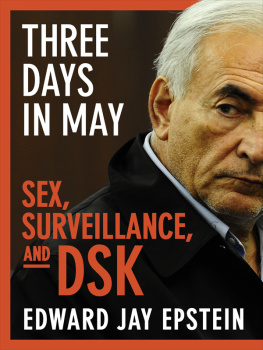First published 1998 by Ashgate Publishing
Published 2016 by Routledge
2 Park Square, Milton Park, Abingdon, Oxon OX14 4RN
711 Third Avenue, New York, NY 10017, USA
Routledge is an imprint of the Taylor & Francis Group, an informa business
Copyright Clive Norris, Jade Moran and Gary Armstrong 1998, collection as a whole
Copyright Individual chapters with respective authors
All rights reserved. No part of this book may be reprinted or reproduced or utilised in any form or by any electronic, mechanical, or other means, now known or hereafter invented, including photocopying and recording, or in any information storage or retrieval system, without permission in writing from the publishers.
Notice:
Product or corporate names may be trademarks or registered trademarks, and are used only for identification and explanation without intent to infringe.
British Library Cataloguing in Publication Data
Surveillance, closed circuit television and social control
1.Closed circuit television - Great Britain 2.Social control
- Great Britain 3.Privacy, Right of - Great Britain
I. Norris, Clive II. Moran, Jade III.Armstrong, Gary, 1954
323.44820941
Library of Congress Catalog-in-Publication Data: 98-71458
ISBN 13: 978-1-84014-126-9 (hbk)
Gary Armstrong is a Lecturer in Criminology and Sociology at the University of Reading. He has published widely on the subject of football and football hooliganism. He is the joint editor of Entering the Field: New Perspectives on World Football (Berg: 1997) and author of Football Hooligans: Knowing the Score (Berg: 1998). From 1995 until 1997 he was a Research Associate at the University of Hull working on a study of CCTV control rooms.
Jon Bannister is a Lecturer in Housing Research, University of Glasgow. He has written extensively on the fear of crime and crime prevention studies and has recently completed a major ESRC funded study into the methodological and conceptual issues surrounding the measurement of the fear of crime.
Sheila Brown has been researching in crime and social policy since 1985. She is currently a lecturer in criminology at Sheffield University. She has undertaken several major research projects on crime and safety for Local Authorities, Safer Cities Projects and Regeneration Partnerships. She is author of Magistrates at Work (Open University Press, 1991), and Understanding Youth and Crime (Open University Press, 1998).
Simon G. Davies is Director General of Privacy International, an international civil liberties pressure group linking privacy and data protection experts in over forty countries. He is also Visiting Fellow at the Computer Security Research Centre at the London School of Economics and a Visiting Fellow in the Department of Law, University of Essex. In this role he has worked on a wide spectrum of privacy issues throughout the world. He is the author of five books, including Big Brother (Pan Books, London, 1996).
Jason Ditton is Professor of Criminology at the University of Sheffield and Director of the Scottish Centre for Criminology. He has published numerous books and articles in the field of criminology, crime prevention and drug usage. His most recent work includes an evaluation of the impact of CCTV in Glasgow and Airdrie funded by the Scottish Office and an ESRC funded project to develop new methodologies for researching the fear of crime.
Nicholas R. Fyfe is a Senior Lecturer in the Department of Geography at the University of Strathclyde. He has published widely on policing and the geography of crime and is co-editor of Crime, Policing and Place: Essays in Environmental Criminology (Routledge: 1992) and editor of Images of The Street: Planning, Identity and Control in Public Space (Routledge: 1998). He is currently undertaking an evaluation of witness protection funded by the Scottish Office.
Martin Gill is a Senior Lecturer and Deputy Director of the Scarman Centre at the University of Leicester, where he is also course director for the M.Sc. in the Study of Security Management. Martin has published in the areas of policing, crime prevention and offenders perspectives. His most recent collection includes the Crime at Work series, Volumes 1 and 2 (Perpetuity Press: 1994 and 1998). He is also the editor of the International Journal of Risk, Security and Crime Prevention.
Richard Giulianotti is a Lecturer in Sociology at the University of Aberdeen he has written extensively on the sociology of football. He is the joint editor, with Gary Armstrong, of Entering the Field: New Perspectives on World Football. (Berg: 1997) and The Sociology of Football (Polity:1998).
Stephen Graham is Reader at the Centre for Urban Technology at the University of Newcastle. He has published widely on the impact of the telecommunications revolution on the structuring of urban spaces. His most recent book, with Simon Marvin, entitled Telecommunications and the City: Electronic Spaces and Urban Places, was published by Routledge in 1996.
Ade Kearns is a Senior Lecturer in the Department of Urban Studies at the University of Glasgow. He has studied the concept and practice of active citizenship and is currently researching social cohesion in a neighbourhood context for the Joseph Rowntree Foundation.
Mike Maguire is Professor of Criminology and Criminal Justice at the University of Wales, Cardiff. He has written and researched many crime related areas, including burglary, criminal statistics, policing, prisons, probation, parole and victims and is co-editor of The Oxford Handbook of Criminology. His current research interests include criminal investigation, with a particular focus upon covert and proactive methods.
Michael McCahill has an MA in Criminology from the University of Hull and is currently undertaking doctoral research funded by the ESRC into the rise of visual surveillance.
Jade Moran Has just completed an M. Phil. in Criminology at the University of Cambridge where she is currently undertaking doctoral research. From 1995 to 1996 she was a Research Support Officer in the Department of Social Policy at the University of Hull working with Clive Norris and Gary Armstrong studying developments in algorithmic surveillance.
Clive Norris is Lecturer in Criminology in the School of Comparative and Applied Social Sciences at the University of Hull. He has written extensively on the sociology of policing. In 1992 he worked with Mike Maguire for the Royal Commission on Criminal Justice and their report entitled

